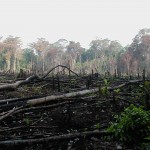
The discussion is based on two studies in the current issue of Science magazine. According to Reuters, one of them says that “cellulosic†biofuels (advanced fuels made from wood and grass as opposed to biofuels made from food crops such as corn) could produce more carbon than gasoline “per unit of energy, averaged over the 2000-2030 time periodâ€. And once again deforestation is the problem: “The land required to plant fast-growing poplar trees and tropical grasses would displace food crops, and so drive deforestation to create more farmland, a powerful source of carbon emissions.â€
The other study highlights that the United Nations had overestimated carbon savings from biofuels and biomass, and the mistake was echoed by the European Union’s cap and trade law. The UN simply ignored the impact of deforestation and other changes in land use. The problem is that “none of the major climate regimes -including the Kyoto Protocol, the European Union’s carbon market and the House-passed climate bill – account for the carbon released by changing land use for biofuelsâ€, says the Washington Post, adding that researchers, including the study’s author and Princeton scholar Timothy D. Searchinger, are worried that bioenergy crops could replace the world’s forests and savannahs on a huge scale unless accounting issues get corrected.
The biofuel industry has already manifested against the report, accusing scientists of trying to perpetuate the dependence on fossil fuel. But that is not what scientists are doing: they are simply calling for a rectification of the methods used to assess the carbon impact of biofuels, which means factoring in land use. They are not against biofuels, but they are aware of the challenges they pose and that they are not exactly carbon-neutral. The point here is to preserve the world’s forests, which are homes to animals, tribal people, sanctuaries of biodiversity and work as natural carbon storage devices – I think we all agree that forests are some of the world’s greatest treasures and preserving them is top priority. Deforesting in order to grow biofuel crops is simply unacceptable.

![Reblog this post [with Zemanta]](https://img.zemanta.com/reblog_e.png?x-id=a18aebe0-b518-48b0-80dc-596007195f1e)





This is why it’s important for these institutions to be as accurate as possible. I don’t want to make false assumptions, but I think these miscalculations are not driven by mere mistake but by self-interests. I think that more and more people should consider it.
This is the classical discussion about if being green is more expensive than using conventional.
it is known that the reason price meat and all products derived from Corn, which directly and indirectly affects 70% of all we eat, went up because, of the demand for Ethanol used in the US.
Additionally, it is a known fact that corn generates gases that kills ozone.
As per this article, yes, the demand for corn, in countries such as Brazil, where you can find cars fully powered by Alcohol, is one of the biggest triggers of Deforestation of the Amazon.
True. I’ve heard about how the creation of biofuel harm certain ecosystems around the world. That’s why I still think that solar, hydro and wind energy are the cleanest energies.